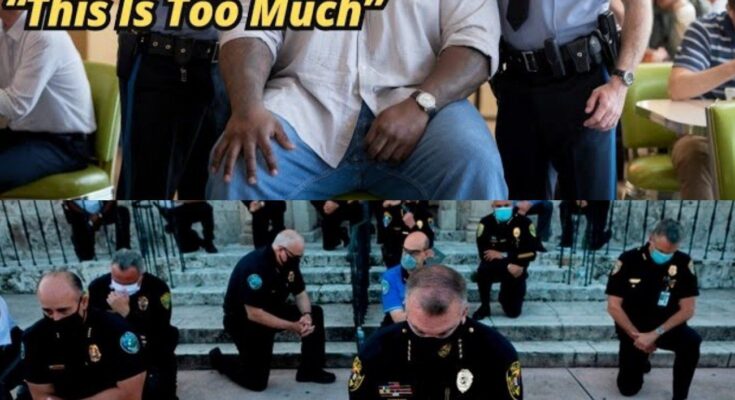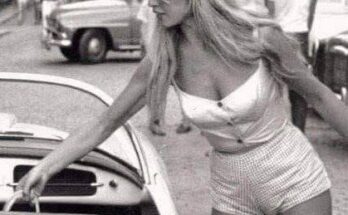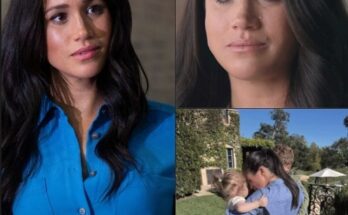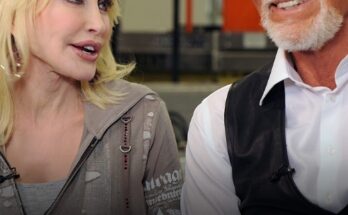It was a quiet, chilly evening in downtown Atlanta when three off-duty officers strolled into a nearly empty diner. Their laughter echoed through the small space as they scanned the room, their eyes settling on a lone figure seated in a corner booth. The man was massive, his towering presence unmistakable, yet his appearance was far from what one would expect of a celebrity. Dressed in an oversized hoodie and worn-out jeans, he sipped coffee and scribbled in a leather notebook.
One of the officers smirked. “Isn’t that Shaquille O’Neal? What’s he doing here looking like that?” he whispered.
“Shaq? No way. If it is, he’s really fallen off,” another officer chuckled, eyeing the man’s scuffed sneakers and unkempt look. Their voices carried further than they intended, but the man didn’t react. He remained calm, focused on his notebook.
Their curiosity got the better of them, and they approached his table. One of them grinned, “Rough night, big guy? Lose a bet or something?”
Another officer chimed in, “You sure you can afford that coffee? Should we chip in?”
The man finally looked up, his deep, familiar voice resonating. “I’m good, thanks.”
As their laughter subsided, one of the officers noticed something resting on the table—a framed picture, its edges worn as if it had been carried everywhere. Expecting a trophy or a glamorous photo, they were taken aback when they saw a child’s drawing. The words, written in colorful markers, read: “Thank you for being my hero, Uncle Shaq. Love, Jamie.”
The diner fell silent. The officers’ smirks disappeared as they realized the significance of the drawing. They had no idea about the story behind it, but they were about to learn a lesson they would never forget.

Shaquille O’Neal was a name synonymous with power, charisma, and success. A basketball legend with multiple championships, he had achieved what most could only dream of. Yet, despite the fame and fortune, Shaq was a man who preferred to walk quietly, never seeking attention for his personal life.
On that table, the framed drawing was more than just a keepsake. It was a symbol of love, a reminder of the responsibility he had taken on in Jamie’s life. Jamie was the son of one of Shaq’s closest childhood friends, who had passed away unexpectedly. With his world shattered, Jamie needed someone to guide him, and Shaq had stepped in without hesitation.
He attended Jamie’s school plays, helped with his homework, and was there when the boy needed a father figure. When Jamie gave Shaq that drawing on his birthday, it was more valuable than any championship ring. In Jamie’s eyes, Shaq wasn’t a basketball star—he was simply the man who showed up when it mattered most.
Shaq’s own life had not been easy. Born in Newark, New Jersey, he grew up in a tough neighborhood where opportunities were scarce. His stepfather, a strict but loving man, instilled in him the values of discipline and humility, teaching him that true success was measured by how much one gave back.
Even at the peak of his career, Shaq had quietly dedicated himself to helping others. He funded scholarships for underprivileged children, paid off families’ debts, and made anonymous donations to hospitals. To him, kindness wasn’t about recognition—it was about making a difference.
As he sat in the diner, the drawing reminded him of his purpose. Fame and wealth were fleeting, but the impact he had on people’s lives was eternal. The officers, now subdued, realized they had grossly underestimated the man before them. Their mockery turned to admiration as they saw Shaq for who he truly was—a man of humility and compassion.
Shaq remained silent, letting the framed drawing speak for itself. He didn’t need to explain; his actions had always spoken louder than words. The officers exchanged uneasy glances before stepping back, their earlier arrogance fading into humility.
One of the officers finally muttered, “I guess we didn’t know the full story.”
They turned and left, leaving behind their misconceptions. Shaq, unfazed, continued his meal, holding no grudges. He had long understood that true kindness required no validation.
Before leaving, he placed a generous tip on the table, a habit of his wherever he went. As he stood, he picked up the framed drawing, holding it gently as though it was the most valuable thing he owned. Stepping into the cool night air, he took a deep breath, the city lights twinkling around him. His thoughts were quiet, steady.
The drawing was more than just a memento; it was a reminder of what truly mattered in life. His legacy wasn’t in trophies or records, but in the lives he touched. He thought of Jamie, of the countless children he had mentored, the families he had supported in silence, and the strangers whose burdens he had lightened without expecting anything in return.
One such story stood out—an eight-year-old boy named Marcus. Living in a disadvantaged neighborhood, Marcus had been battling leukemia for two years. Despite his illness, his dream of playing basketball kept him hopeful. When Shaq heard about Marcus, he reached out without fanfare, without cameras—just a man wanting to help.
The first time Shaq visited Marcus in the hospital, the boy’s face lit up with joy. Shaq didn’t focus on the illness; instead, he talked about basketball, sneakers, and even joked about whether Marcus could beat him in a game of one-on-one. For a moment, the burden of Marcus’s condition seemed to lift.
Shaq didn’t stop at one visit. He became a regular, bringing jerseys, basketballs, and custom sneakers signed by Marcus’s favorite players. More importantly, he brought his time. They played video games, shared stories, and talked for hours. When Marcus was too weak to move, Shaq would sit by his bedside, simply being there.
One day, Shaq arranged for Marcus and his family to attend an NBA game, ensuring they had front-row seats. At halftime, Marcus was invited onto the court to shoot a basket—a moment that became the highlight of his young life.
Shaq never sought recognition for these acts. He believed that if one was blessed, they had a duty to bless others. And so, he continued, quietly making a difference.
As he walked to his car that evening, the framed drawing in his hand, Shaq reflected on the people he had helped, the lives he had touched. The impact of kindness, he knew, was greater than any championship ring.
That night, the officers left the diner with a lesson they would never forget. They had entered with assumptions, but they departed with humility, understanding that appearances can be deceiving. Sometimes, the quietest acts of kindness come from the most unexpected places.
Shaquille O’Neal’s story wasn’t just about basketball. It was about compassion, humility, and the quiet strength to uplift others. And for those who heard his story, it served as a reminder to look beyond the surface and embrace kindness in their own lives.
See More: Chiefs’ Super Bowl loss to Eagles adds to legacy of the Kobe-Shaq Lakers as last successful three-peat
No team has matched what Kobe and Shaq’s Lakers did at the start of the century
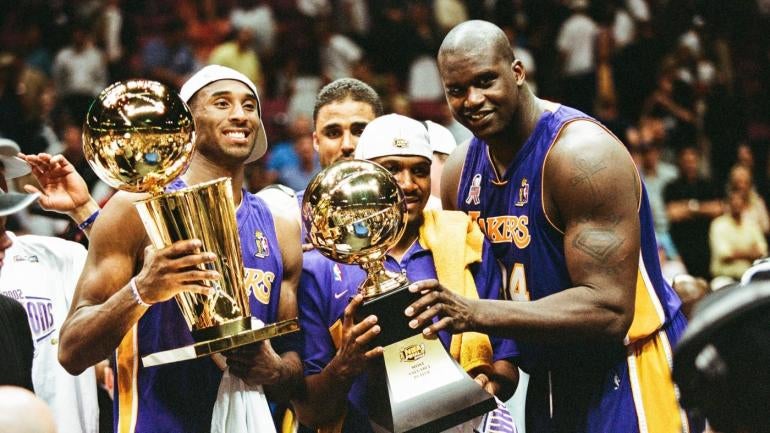
For all of their success, one of the enduring legacies of Kobe Bryant and Shaquille O’Neal’s partnership is the fact that they led the last successful three-peat in North America’s four major professional sports leagues.
From 2000-02, the Los Angeles Lakers won three straight NBA titles, a level of success that the Chiefs tried to match this season but ultimately came up short of achieving following their 40-22 loss to the Eagles in Super Bowl LIX. Kansas City joined the eight previous back-to-back Super Bowl champions that were unable to three-peat. The 1965-67 Packers remain the NFL’s last team to win three straight titles.
The early 2000s Lakers’ success came at the heels of the Michael Jordan-led Chicago Bulls’ dominance of the NBA in the ’90s that included not one but two successful three-peats. The 2000s Lakers’ three-peat concluded just four years after Jordan led the Bulls to their second successful three-peat and less than two years after the Yankees won their third consecutive World Series title.
Four three-peats in less than a decade’s time probably watered down the Lakers’ accomplishment. Instead of celebrating it, the immediate question was how many more titles Kobe and Shaq would win together in the coming years.
The answer was ultimately zero. Los Angeles’ sweep of Jason Kidd’s Nets in the 2002 NBA Finals was the final championship for those Lakers teams. The Lakers made it back to the NBA Finals in 2004, only to get flattened by the Detroit Pistons in a gentlemen’s sweep. Shaq was traded that offseason, thus ending one of the most successful, entertaining and polarizing partnerships in the history of sports.
Dominant is also a word you could accurately use to describe the Lakers in those years. The 2001 Lakers went 15-1 in the playoffs, as it took a herculean effort from Allen Iverson in the Finals for Los Angeles to suffer a postseason loss. The Lakers responded to their lone playoff loss with four straight wins en route to successfully defending their title.
A year later, the Lakers breezed past the Trailblazers and Spurs in the first two rounds before surviving an epic, seven-game battle with the Kings. In the Finals, Kobe and Shaq’s talent was on full display as they dismantled the outmatched Nets in four games.
In the decades since their time as teammates, there seems to have been more of a focus on what Kobe and Shaq didn’t do together. That might start to change, however, if they continue to stand as the last partnership that won three consecutive titles together, a stretch of time that is now at 23 years and counting.
